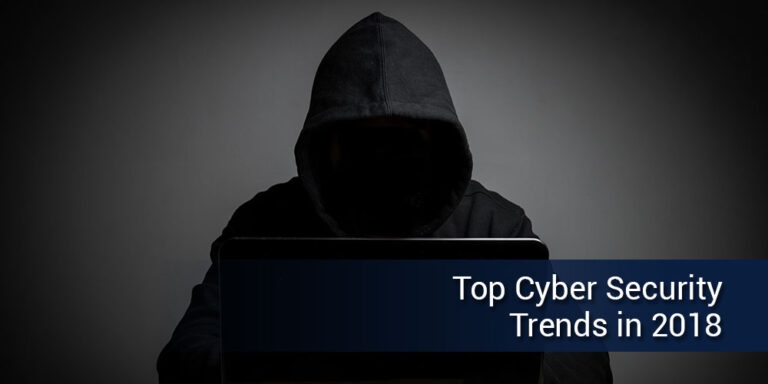With so many people online, cyber threats and attacks have been invading everybody’s privacy and misusing people’s personal data. Online personal information gets hacked and the information is used unethically. 2017 saw Cyber Security becoming even more crucial because of massive data leaks like the Equifax hack, where hackers got access to Equifax’s credit reporting company customers and penetrated through more than 143 million customers’ information, including names, date of births, social security numbers, addresses, and driver’s license information. This is a huge threat to the customers since hackers had access to all the information necessary for identity theft and fraudulent transactions.
Therefore, it has become even more important to consider improvised cyber security methods to control the increasing number of online thefts and attacks in 2018.
It’s time to learn about some popular cyber security trends in 2018 which need to be adopted by organizations to keep online thieves and hackers away from breaching sensitive data.
What you'll find in this article
- 1 1. More regulation on privacy and data protection
- 2 2. Enhancing Artificial Intelligence (AI) measures
- 3 3. Biometric Authentication
- 4 4. Higher rate of cyber attacks against IoT (Internet of Things) devices
- 5 5. Intense Healthcare industry’s attempt to safeguard itself against cyber threats
- 6 6. Increased ransomware attacks
- 7 7. Protecting smart manufacturing from cyber hacks
- 8 8. More attacks on cryptocurrencies
- 9 9. Data minimization and rethinking Personally Identifiable Information (PII)
- 10 10. New job titles for ethical hackers in demand
1. More regulation on privacy and data protection
With the on start of 2018, Cambridge Analytica Data disclosed that the world’s biggest social media site, Facebook, had 2.2 billion users reported to have assumed malicious third-party scrapers, which compromised their public profile information indefinitely. It was the activated search feature of Facebook that enabled cyber attackers to decode the full names of people associated with the email addresses or phone numbers on the social media site. This collected information was more prone to be targeted by cybercriminals to misuse particular individual information using social engineering and other cyber attacks.
To combat this serious issue, Facebook has now deactivated the open search feature to protect its user private data. Facebook is now restricting third-party apps from accessing users’ information about their personal details.
2. Enhancing Artificial Intelligence (AI) measures
AI and machine learning can prove to be an effective weapon to protect against complicated cyber attacks today. Using AI-based behavioral authentication and machine learning algorithms, authentication solutions for cyber security can build a robust user profile. These measures will also recognize any unusual pattern of users if any data is breached by a hacker as these algorithms can immediately deny access from an unauthorized user. In the world of big data, using AI and machine learning to assess data and spot potential threats is the next big leap to stop cyber criminals from invading into confidential data.
3. Biometric Authentication
With Apple’s introduction of FaceID, improved biometric authentication method has come to everyone’s attention. The seamless FaceID technology and biometric authentication make it attractive to users to get rid of password driven security measures that can be hacked easily. Furthermore, biometric authentication enhances security because it is not easy to get decoded.
4. Higher rate of cyber attacks against IoT (Internet of Things) devices
From keyless entries to offices and homes, to printers, and medical devices, IoT gadgets are everywhere. Many of these lack security features which make them accessible to potential cyber attacks. Makers of IoT devices should offer already built-in security, and the authorization method to access these devices should be hardcore.
5. Intense Healthcare industry’s attempt to safeguard itself against cyber threats
Health data is highly valued on the dark web and hacking into the healthcare industry is on a constant rise. More ransomware attacks and hacking of medical devices such as MRI machine and even printers are expected so secure logins to these devices should be implemented.
6. Increased ransomware attacks
WannaCry attacks are other examples of outbreaks that aimed at multiple industries and made companies reconsider their cyber security techniques. It is important for large organizations to take all the necessary steps to protect themselves against these attacks and train and educate employees against suspicious emails and links and to not fall for spams or fraudulent messages sent to them via SMSes or online.
7. Protecting smart manufacturing from cyber hacks
Smart manufacturing is transforming the production process in so many industries nowadays but most manufacturing environments are designed without considering the cyber security of commercial IoT devices. Therefore, there is a serious need to invest in gadgets which are password protected with hardcore security systems.
8. More attacks on cryptocurrencies
Bitcoin and other cryptocurrency providers are enabling mom and dad investors as well as individuals to manage their finances online through this provision. But due to limited guidelines on the security of using cryptocurrency, it has become more vulnerable to hackers. There needs to be more secure gateways to accessing crypto coins online for users.
9. Data minimization and rethinking Personally Identifiable Information (PII)
Customers’ Personally Identifiable Information (PII) for authentication is big pool of valuable data for any hacker. Being extremely hard to protect, PII can be accessed by online thieves easily. With present cyber security measures such as relying on security compliance, threat protection, encryption, and data-loss prevention methods, data minimization is the new trend for 2018.
10. New job titles for ethical hackers in demand
As an outcome of the TalkTalk data breach, industry groups have raised their requirement of appointing a CCO (Chief Cybercrime Officer) who can work regularly to protect computer systems and online platforms from cyber attacks.
With new technology getting discovered by the minute of the day, more cyber crimes and online attacks are expected. This is why companies need to continuously work on improving the present cyber security methods to catch up with the new threats coming in with the advancing technologies of today.


